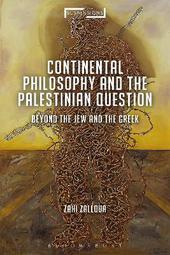
|
Continental Philosophy and the Palestinian Question: Beyond the Jew and the Greek
Hardback
Main Details
| Title |
Continental Philosophy and the Palestinian Question: Beyond the Jew and the Greek
|
| Authors and Contributors |
By (author) Zahi Zalloua
|
| Series | Suspensions: Contemporary Middle Eastern and Islamicate Thought |
|---|
| Physical Properties |
| Format:Hardback | | Pages:240 | | Dimensions(mm): Height 234,Width 156 |
|
| Category/Genre | Ethics and moral philosophy |
|---|
| ISBN/Barcode |
9781474299206
|
| Classifications | Dewey:172 |
|---|
| Audience | | Undergraduate | | Postgraduate, Research & Scholarly | |
|---|
|
Publishing Details |
| Publisher |
Bloomsbury Publishing PLC
|
| Imprint |
Bloomsbury Academic
|
| Publication Date |
23 February 2017 |
| Publication Country |
United Kingdom
|
Description
From Sartre to Levinas, continental philosophers have looked to the example of the Jew as the paradigmatic object of and model for ethical inquiry. Levinas, for example, powerfully dedicates his 1974 book Otherwise than Being to the victims of the Holocaust, and turns attention to the state of philosophy after Auschwitz. Such an ethics radically challenges prior notions of autonomy and comprehension-two key ideas for traditional ethical theory and, more generally, the Greek tradition. It seeks to respect the opacity of the other and avoid the dangers of hermeneutic violence. But how does such an ethics of the other translate into real, everyday life? What is at stake in thinking the other as Jew? Is the alterity of the Jew simply a counter to Greek universalism? Is a rhetoric of exceptionalism, with its unavoidable ontological residue, at odds with shifting political realities? Within this paradigm, what then becomes of the Arab or Muslim, the other of the Jew, the other of the other, so to speak? This line of ethical thought-in its desire to bear witness to past suffering and come to terms with subjectivity after Auschwitz-arguably brackets from analysis present operations of power. Would, then, a more sensitive historical approach expose the Palestinian as the other of the Israeli? Here, Zahi Zalloua offers a challenging intervention into how we configure the contemporary.
Author Biography
Zahi Zalloua is Associate Professor of French and Interdisciplinary Studies, Whitman College, USA.
ReviewsThis is an important book: a historically sensitive and theoretically rigorous intervention on behalf of the Palestinian cause and at the same time a thorough critique of every form of exceptionalism and exemplarity that shores up the totality of the human condition in the name of one chosen cause, suffering, or people. In addition, Zahi Zalloua does a commendable job of exposing the blind spots of so called radical continental philosophers and their Eurocentric mis-recognition of the Palestinian Question. -- R. Radhakrishnan, Chancellor's Professor of English and Comparative Literature, University of California, Irvine, USA If one of the most emblematic tragedies of the twentieth century unfolded under the heading of the "Jewish Question," in the twenty-first century we are confronted by the "Palestinian Question." Zalloua's excellent book is one of the few studies available that addresses the issue philosophically and raises this pressing question not only relying upon but also dialoguing with and critically modifying the resources of Continental thought. Not to be missed by postcolonial theorists and philosophers alike! * Michael Marder, Research Professor, Ikerbasque, Department of Philosophy, University of the Basque Country, Spain & Professor at Large, Humanities Institute, Diego Portales University, Chile * In this searing, courageous and long overdue book, Zahi Zalloua asks how a Levinasian ethics of the other translates into specific historical and political life marked by relentless subjugation and injustice. The question of the other is asked where in the end it matters most: What about the other deemed illegitimate in the eyes of the majoritarian community? Pushing beyond the dyad of the "Greek" and the "Jew," Zalloua engages philosophers from Levinas to Said, with Agamben, Badiou, Butler, Blanchot, Deleuze, Derrida, Finkielkraut, Ranciere, Zizek and others, to account for the ways in which continental philosophy has addressed the Palestinian Question over the last two decades. Deconstructing the faceless Palestinian, the ungrievable homo sacer deemed unavailable for an ethical encounter, Zalloua exposes the need for an alternative to the account of radical alterity and its historical and political bias. A book to be urgently read and discussed. * Elisabeth Saatjian Weber, Professor of German and Comparative Literature Chair, Department of Germanic and Slavic Studies, University of California, USA * In the tradition of Cesaire and Fanon, Zahi Zalloua provides penetrating insight into the heart of the humanist project, revealing a profound crisis around the haunting figure of the Palestinian. Capacious and breathtaking, Zalloua's book traces this deafening silence. The last sky is upon us and Zahi Zalloua's masterful work is as vital as it is urgent -- Sohail Daulatzai, Associate Professor, Film and Media Studies - University of California, Irvine, USA
|